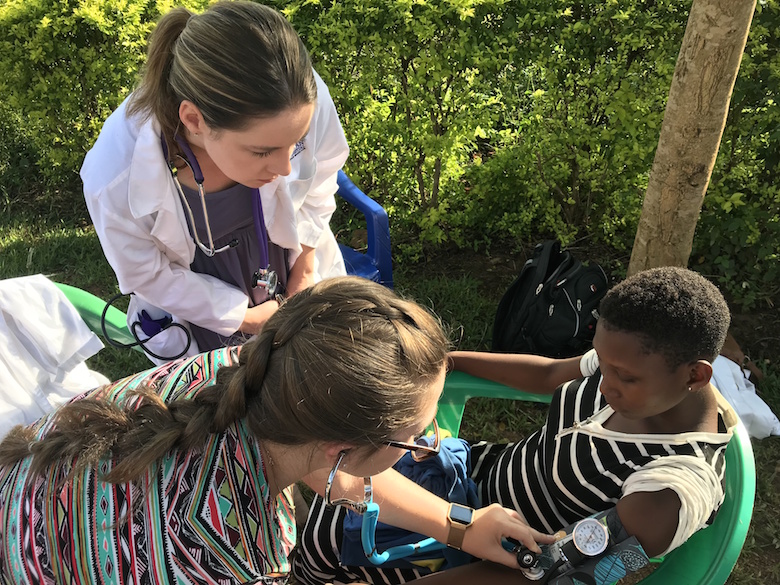Wilkes fourth-year pharmacy student Michael Hummel knew he needed more practice doing blood pressure screenings. After helping with a screening event attended by more than 150 people at a church in Kijinjubwa, Uganda, he felt like a pro.
“People were talking, trucks were going by outside, as I tried to listen. By the time I was done, I could get a reading pretty quickly,” Hummel said, laughing at the memory.
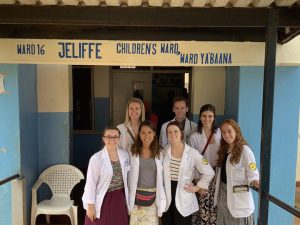
Student pharmacists from the Nesbitt School of Pharmacy spent four weeks in Uganda. Pictured, first row from left, are Autumn Peck, Mayi Batista Quevedo, Bethany Chmil and second row from left, Katie Campf, Michael Hummel and Brittany Gurreri
The blood pressure screening was one of the events that seven students in Wilkes University’s Nesbitt School of Pharmacy participated in during a five-week advanced pharmacy practice experience in Uganda. The students got a global health perspective, learning how pharmacy is practiced in a Third World country. In addition to Hummel, the group included Kathryn Campf, Bethany Chmil, Himayapsill (Mayi) Batista Quevedo, Brittany Gurreri, Autumn Peck and Rubi Mink. The students were accompanied by Dana Manning, associate professor of pharmacy practice and Wilkes alumna Stacy Prelewicz, a clinical pharmacist at the University of Utah Health Huntsman Cancer Institute in Salt Lake City, who serves as a preceptor for the Nesbitt School.
Wilkes pharmacy students have had the option of gaining clinical experience in Uganda since 2012. The trip provides opportunities to share their expertise with pharmacists and pharmacy students in the African country while learning about global health issues. In fall 2018, students traveled to Uganda from Oct. 23 to November 19th. Members of the team shared their experiences at a Dec. 12 presentation on campus.
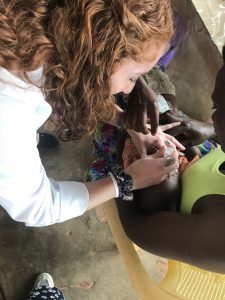
Fourth-year pharmacy student Rubi Mink administers oral vaccine to an infant.
Their first stop was Makerere University School of Pharmacy in Kampala, Uganda’slargest city. The Wilkes students taught their Ugandan counterparts clinical skills, such as doing blood pressure readings, and covered topics that included pharmacy practice in the United States, acute malnutrition, oncology, drug management and use of mobile technology and pharmacy. They also did hospital rounds and teaching with Makerere pharmacy interns at the Mulago National Referral Hospital and at some of its satellite hospitals. A favorite highlight for the Wilkes student pharmacists was working at a baby vaccination clinic for a day, helping to weigh and track the growth of the babies and providing education and blood pressure screening to the mothers.
The students were quick to note the differences between pharmacy practice in the United States and in Uganda. Brittany Gurreri summed up the group’s reaction, saying, “I didn’t really know what to expect, but what I didn’t realize was how large of a gap there is between practicing pharmacy in the United States and practicing pharmacy in Africa. They have limited access to resources in comparison to us, but maybe have more of have an opportunity to dictate how patients are cared for in contrast to us practicing in America. While they may have less resources, they are doing the best they can do with what they have and it’s very humbling to see how creative they can be and how thankful the patients are. In the United States, patients expect high quality healthcare; in Uganda most may not even expect healthcare in general.”
Limited access to the internet was another key difference, noted student Bethany Chmil. In the Nesbitt School, the students are taught the importance of consulting online databases in prescribing. Ugandan pharmacists don’t have that luxury. “There, you have to do things on your feet,” Chmil said.
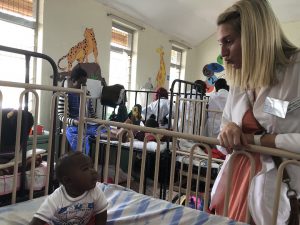
Student pharmacist Katie Campf interacts with a young patient in a children’s ward.
Limited access to prescription drugs and medical equipment in Uganda was another key difference. “They had many limitations to their medication choices,” said Katie Campf, adding that such limitations contrasted dramatically with the many drug treatment options available in the United States.
Before leaving Kampala, the group visited Gonsha Rehema, a pharmacist who has visited Wilkes in the past and now who owns Extra Care Pharmacy, a community pharmacy in Kampala. It was clear that community pharmacies play an important role in Uganda, where they may be a patient’s first – or only – stop for care. “Women have walked into that pharmacy and given birth on the floor there,” Campf said. The students emphasized how much the role of a community pharmacist as a critical resource for the community was highlighted during the visit.
The group’s interaction with community pharmacists continued when they went to Masindi, a small town in northwest Uganda. The group presented training on clinical skills to drug shop owners and pharmacists. The training included blood pressure measurement and assessment and drug use in pregnancy and lactation. Members of the Wilkes team prepared a meal for the event and donated 15 automatic blood pressure cuffs to attendees. The group also visited the Masindi Kitara Medical Center, gaining more clinical experience in internal medicine, obstetric care and pediatrics. They also provided blood pressure screenings at a church in Kijinjubwa.
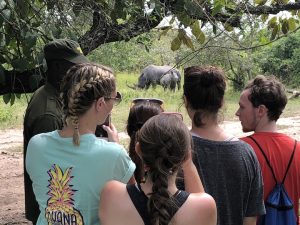 On weekends, the group visited tourist sites, including the Gaddafi Mosque, the Equator, the Ziwa Rhino Center, white water rafting on the Nile, and a short safari trip to Murchison Falls National Park. Although the cultural aspects of the trip were memorable – it was hard to forget standing mere feet from a rhinoceros — the most lasting impressions came from the Ugandan health-care system.
On weekends, the group visited tourist sites, including the Gaddafi Mosque, the Equator, the Ziwa Rhino Center, white water rafting on the Nile, and a short safari trip to Murchison Falls National Park. Although the cultural aspects of the trip were memorable – it was hard to forget standing mere feet from a rhinoceros — the most lasting impressions came from the Ugandan health-care system.
When reflecting on lessons learned from the trip, Chmil said, “I’ve learned to be ok with uncomfortable and with situations and places that make me uncomfortable, while staying open to doing the best I can for patients.” That ability, she said, will prepare her to be able to work as a pharmacist in many settings while.
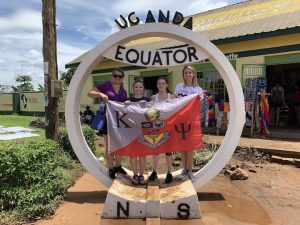
Visiting the equator was one of the stops on the four-week visit to Uganda for students from the Nesbitt School of Pharmacy.
All of the students were impressed with the support that patients receive from their family and from the community in Uganda. They say it’s the kind of support the United States would do well to emulate. “People who had strong family connections had better outcomes,” Hummel observed.
But most of all, they agree that the experience taught them that they had something to offer, even when working in conditions with few resources. Rubi Mink stated, “Don’t doubt the difference you can make.” The group also agreed that the generous welcome and open sharing of knowledge and culture from the Ugandan people they worked with made this an experience that will stay with them for a lifetime.
